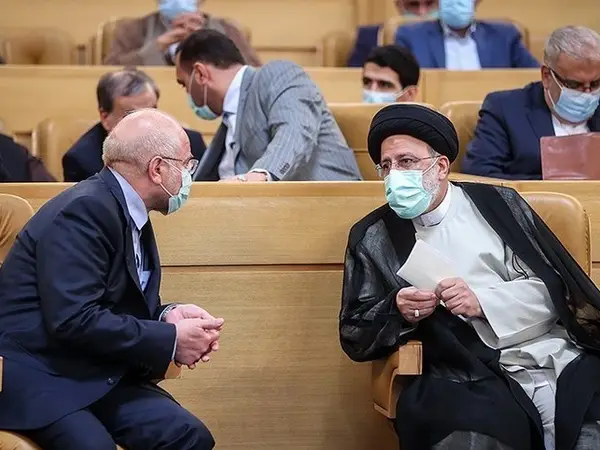President Ebrahim Raisi and Parliamentary Speaker Mohamad Bagher Ghalibaf denied their differences during a meeting at the Iranian parliament earlier this week.
Nonetheless, despite the denials, disputes between the media outlets affiliated with the two sides appear to be escalating.
But power struggles is not limited to the executive and legislative leaders. There were indications in the latest news conference of Iranian Judiciary Chief Gholamhossein Mohseni Ejei on Thursday about possible differences between him and Raisi.
Speaking about a major financial corruption case, Ejei revealed that Raisi's statement about handing over nearly 60 government officials to the Judiciary for their involvement in the case was not true. Ejei made it clear that "The government has named no one for involvement in the case."
In another development, according to Khabar Online, while Raisi has spoken about coordination of efforts between the parliament and the government, Ghalibaf has expressed concern that a difference of tastes between the two are likely to turn into disputes."
The website wrote that when Ghalibaf and Raisi met on Tuesday morning, pro-Ghalibaf newspaper Sobh-e No's editorial against Raisi's performance had already been published. The editorial called Raisi's supporters "super revolutionaries" and pointed out that Raja News, a website maintained by a close relative of Raisi has been attacking Ghalibaf for a few days.
The pro-Ghalibaf daily further added that he and Ejei agree that the country's most important problems are about the economy. Consequently, the country needs legislations to prevent financial corruption cases in which government officials are regularly involved.
Nearly all fingers point at Raisi as the man responsible for the latest corruption case. Many have said that if the affair took place during the last two years of the Rouhani administration (2019-2021), Raisi should have prevented it as Judiciary Chief at the time. And if it took place during the past two years, then Raisi as president will be in a worse position as his share of the responsibility will be even bigger.
Government media outlets including Iran newspaper, the only mention Ejei and Ghalibaf in connection with the corruption case. They never say anything about Raisi, Khabar Online observed.
Media close to Ghalibaf, on the other hand, attack Raisi’s supporters in the ultraconservative Paydari party who constitute a powerful bloc in parliament, trying to increase their seats in the March elections.
However, rivalry between Ghalibaf and Raisi goes beyond the upcoming parliamentary election as both men know very well that Ghalibaf's main objective is to win the Presidential election in 2025. Ghalibaf is also aware that in any election in Iran he will have far more votes than Raisi. His calculation is based on the precedence left after the 2013 Presidential election when he was forced, by Khamenei’s men, to drop out of the race, to give Raisi a chance to win that election. Raisi, however, lost to relatively moderate Hassan Rouhani.
Meanwhile, Ghalibaf's supporters have accused the Raisi Administration of trying to intervene in the March election. To take revenge on Raisi, Ghalibaf’s men in parliament changed the Development Plan submitted by Raisi’s administration beyond recognition. Subsequently the president complained to Khamenei that what the parliament has approved cannot be implemented.
Despite all their differences, both Ghalibaf and Raisi told the press after their meeting that "We will not let others to take advantage of the difference in the two branches of the state. This will never happen!" As Khabar Online noted, regardless of what they say, it is difficult to believe pleasant words from any side. The two men's body language during the meeting, and the continuation and rather escalation of the war of words in their media outlets tell another story.
